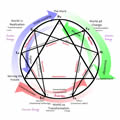Two Different Questions... Two Different Worlds
2015-03-01
I was speaking to a good friend of mine today, along with his rather precocious ten year old daughter. During the conversation there arose the typical question of “How’s school going for you?” and the not unexpected answer, “I don’t like any of my classes.” If I recall correctly, “hate” was actually the descriptive word used… said with all the unreserved conviction and certainty of a 10 year old who has no doubt about how she feels.
“Not one class that you like?”
“Well… maybe gym class.”, she responded.
“So let me ask you a question.”, I said. “Are you aware that you can actually decide what you like and don’t like? To which she responded that yes, she understood that. I then asked her, “So why do you choose to dislike your classes?” She appeared to register the strange contradiction of having to suffer through classes that she, herself, had in some way chosen not to like, but she didn’t have an immediate answer to the question.
I didn’t press her any further, but I did say that I wished that someone had helped me to understand how to be free of like and dislike when I was 10; that I didn’t encounter the teaching about like and dislike and the Reactional Self until I was about 25; and that it would have been far better if I had been taught about like and dislike much earlier.
It was only later, after the call had finished, that I received a shock when I saw that this comment about “better” was still coming from the Reactional Self. Like Aurobindo (see the 2015-02-25 post), I could easily make the case that it was perhaps more useful to go through the years of struggle with like and dislike than to have been led past this early on.
What the “shock” revealed was that the Divided Self has a very different way of dealing with this notion of “better”. Here’s what I saw…
The Reactional Self typically uses “better” in the sense of comparing some situation to some other situation; as in, “Is it better to be told about like and dislike at 10 years old or at 25?” The Reactional Self also typically adds in a vibration or energy of “judgment” (good or bad) along with the apparently objective comparison.
The Divided Self uses “better” in a very different way. Instead of judgment, there is discernment. And the evaluation of better takes the form of, “Does this take me toward myself and my aim, or does it take me away?” One might call it a “3D” recognition of “what is”, rather than a “2D” comparison with what might have been. So when the Divided Self is presented with the question, “Is it better to be told about like and dislike at 10 years old or at 25?”, it responds by saying, “Who knows, and really, who cares? What’s more to the point is that you’ve been told, now what are you going to do about it?”
If we can see that these two questions, “Is it better…” and “…now what are you going to do about it?” not only come from two different levels of Selfhood, but really come from two different worlds, we can begin to see the Reactional Self for what it is, and also the possibilities for moving beyond it.
- John Hutcherson's blog
- Log in to post comments
